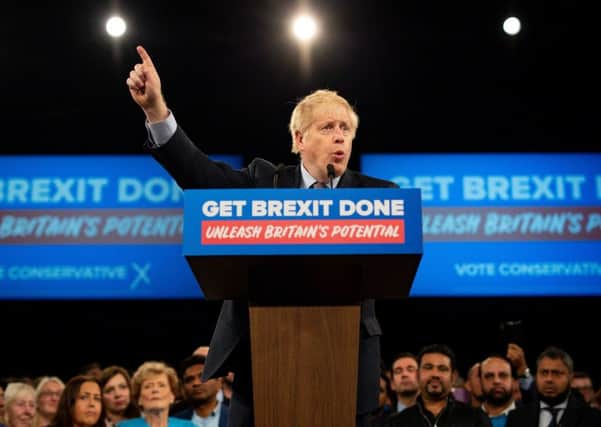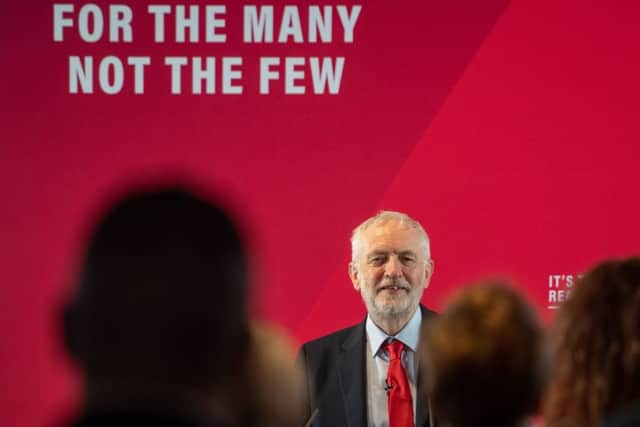Tax cuts must be general election priority for Boris Johnson and Jeremy Corbyn – Sam Packer


The Conservatives accuse Labour of being Stalinist spendthrifts, whilst setting out a series of spending guarantees that, according to the Resolution Foundation, will bring public spending back to 1970s levels.
Advertisement
Hide AdAdvertisement
Hide AdLabour suggest that the Tories are cruel, austere toffs who will not provide the “investment” that the country needs. Yet analysis from the Centre for Policy Studies says Labour’s renationalisation plans could cost around £176bn – almost one tenth of the national debt.


In a way this arrangement suits both parties; Labour can be brave socialists tackling Tory meanness, and the Conservatives can play the prudent party of government. Unfortunately, it does not suit ordinary taxpayers who fear a continuation of the high taxes that are hitting household income and battering businesses, as Barry Hearn wrote on these pages a few months ago.
Recently the Chancellor has been keen to emphasise Labour’s extravagant spending plans, relishing estimates that suggest an increase in public spending of £1.2 trillion. This figure itself, around £2,400 per taxpayer, per year, should be enough to raise the alarm that we are moving into uncharted territory. In Yorkshire, that would mean additional annual tax bills almost as large as the average monthly payslip.
Advertisement
Hide AdAdvertisement
Hide Ad

The Tories are less keen to discuss their own plans. This is perhaps understandable when the only economic pledges they have made since the Prime Minister took office are public spending increases. In spite of talk that the Conservatives are the party of lower taxes, in the past nine years the tax burden has risen and currently sits at a 50-year high. The Tories have not proposed a serious tax cut for years, preferring to tweak away and freeze anything they didn’t want to put up.
For supporters of letting people keep more of their own money, Boris Johnson’s leadership election policy of raising income tax thresholds, in order to address the fiscal drag of the past two decades, was welcome. But there has been a stony silence on that, or any other tax cuts, since.
Advertisement
Hide AdAdvertisement
Hide AdOf course, taxpayers should be under no illusions at the taxes they would face from a Labour Government. Labour’s 2017 manifesto promised a deluge of hundreds of billions of pounds of new spending, and that was relatively Spartan compared to the plans that have emerged since. The £1.2 trillion figure will be endlessly debated, but even if one approves of borrowing billions, there will be hundreds of billions that need to be paid for with tax rises.
For many people, this election will feel like Hobson’s choice; whoever wins, we seem likely to get big spending and higher taxes. It’s not surprising therefore that taxpayer voters are fed up: our landmark polling released last week shows that voters are demanding lower taxes.
The desire for tax cuts applies across a range of different levies, the very same ones that would likely have to be raised to fund spending pledges. More than half of the voters we polled wanted the basic rate of income tax cut by a quarter and over three-quarters backed a cap on council tax rises.
Voters were in favour of inflation-linking income tax bands, reducing corporation tax to Ireland’s 12.5 per cent, raising the stamp duty threshold so it’s only paid by millionaires and scrapping the licence fee.
Advertisement
Hide AdAdvertisement
Hide AdThe importance of “Workington man”, who could of course equally be Wakefield or Whitby man, has been repeated ad infinitum at the start of this election campaign. What our polling shows is that if the political parties really want his vote, then they should rethink their strategies and start prioritising tax cuts. Significantly, working-class voters are twice as likely to support cuts to corporation tax and keener on reducing taxes on small businesses.
Politicians have got this one completely wrong. In reaching for stereotypes to try and craft an election-friendly message, both the main political parties have turned on the spending taps at a time when real swing voters desperately don’t want to pay for a higher water bill.
Both parties would do well to reflect on their promises. A few billion spent there for this, or £1.2 trillion taxed there for that, might be the final straw for many ordinary taxpayers. The voters of Wakefield, Whitby, Workington and the entire UK might reward a political party which said enough was enough.
Sam Packer is Media Campaign Manager at the TaxPayers’ Alliance.